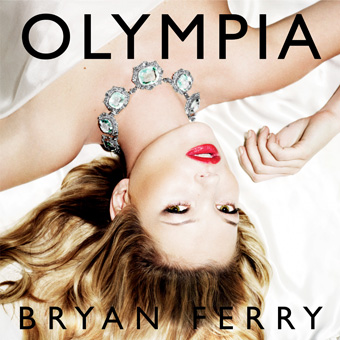It was interesting to note that Bryan Ferry’s recent appearance on Strictly Come Dancing, while rather mundane, did not grate to the extent of Alice Cooper in the preceding week. At least Ferry – even the Ferry of old, the gauche and elegant mainstream subversive – would have actually fitted into the sheen, polish and obvious glam of the Strictly… dance floor.
As such, and for old times sake, really, we should give him the benefit of the doubt, despite his hard sell. Two days later he was smouldering on Later with Jools Holland. Not such a bright move, perhaps, as Later… has started to strongly reflect its own title. A show beyond its sell-by-date, limping on by placing new acts side by side with hoary oldies: from Clapton’s pitiful blues retreads to Neil Diamond’s shameless jukebox.
Not that I – God forbid – am in any position feel justifiably ageist. On the contrary. One gives a hard glance to those who used to speak for us; to live our dreams and show us some kind of special moment. But Bryan Ferry? Didn’t we see him lead the painful dismantling of Roxy Music – the most gloriously innovative act of the whole glam rigmarole – until they shred every last ounce of anarchy, languishing like bloated 80s pop behemoths?
To its credit, Olympia stretches towards some kind of interesting angle. From the outset, it tries. That alone lifts it above much of Ferry’s work during the past two decades; that it isn’t entirely successful is somewhat ironic. In effect, it tries a little too hard, drafting in an impressive array of supporting artists including Jonny Greenwood, Dave Gilmour, The Scissor Sisters, Eno and Nile Rodgers – again, if anything, too many interesting angles, for it’s an album that tugs back and forth, endlessly pushing for that element of surprise and yet remaining strangely uneven. Although given the disparate nature of the contributors, maybe unevenness is not so surprising. Especially as some of the recordings, such as ‘Heartache By Numbers’ with The Scissor Sisters, stretch back a full five years.
However, the one unifying element lies in the title, Olympia referring both to the studio and surrounding salubrious area of Kensington. It sets an undertone, if nothing else, and one can easily imagine the man himself walking the Kensington streets, songs and ideas flitting through his head, stopping off for a coffee and lingering over a copy of The Times. Ferry was always the master of implanting such warmingly simple visions in the mind of the listener.
It is impossible to encounter a Bryan Ferry solo album without casting a thought back to the record that made such a thing seem so effortlessly subversive. These Foolish Things was a courageously reactionary affair that seemed quite the antithesis of the Eno/Manzanera driven Roxy Music of early vintage. Indeed, more than that it was ‘thrillingly’ conservative and yet, within that tight suited framework, came something genuinely liberating. Who can forget Ferry launching such a courageously warm version of ‘A Hard Rain’s Gonna Fall’ into an entirely unprepared singles chart in 1973? A moment of true pop subversion.
It would be unfair to expect the same here, although Richard Williams’ sleeve notes suggest an immediate ‘party atmosphere’ encompasses the opening song, ‘You Can Dance’. Well, it doesn’t conjour up visions of mild banter and the frisson of sexual possibility to me. The party in my mind suggests a disappointingly sober gathering.
‘My Oh My’ is of more interest, and those of a Floydian bent will notice the distinctive guitar of David Gilmour locked in battle with the similar electric strings of Oliver Thompson. Listen deeper and Brian Eno’s welcome presence can be discovered; “Nothing is real, nothing is true, I wish I could say the same thing about you,” croons Ferry, and it does tend to echo down the years to Roxy as untameable shiny beast. ‘Shameless’ benefits from a moment of brilliance as Groove Armada’s production tugs towards a Eurogroove, although I’m not so enamoured with the choice of Tim Buckley’s iridescent ‘Song to the Siren’. Robert Plant nailed this with the gloriously simplistic rendition on the 2002 Strange Sensation album, Dreamland. By contrast, we find five guitarists muscling into the mix (including Gilmour, Nile Rodgers and Jonny Greenwood). It is over-worked to bulging point, and is perhaps the clearest indication of the main problem with this album.
In the end, one is left with all the frustration of an album that, while reasonable in every sense, is unlikely to make many returns to hi-fi or iPod. With simplification, or an inspiring lack of resources perhaps, it could have attained that vital spark. What a shame, given that we had expected Olympia to mark a return to form. Maybe one day – maybe next time – he will deliver an album that lifts you to a state of filmic joy as you prepare for a night out. The fact is, he’s still capable of doing just that.


